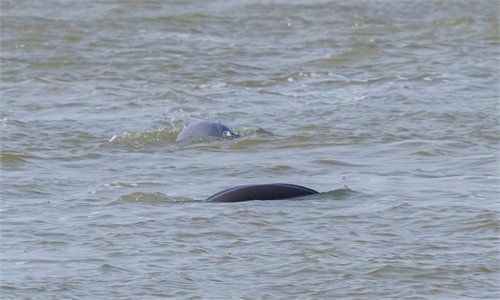Update: 'Extinct in the wild' species has eggs laid unprecedentedly in wild waters; still a long way to go to resume Yangtze Sturgeon's wild breeding: expert

The first batch of baby Yangtze Sturgeons, an ''extinct in the wild'' fish living in the Yangtze River, has been successfully hatched in the wild without artificial intervention. Photo: Snapshot from CCTV News.
The unprecedented success of Yangtze Sturgeon laying and hatching eggs in an experiment is a crucial step towards restoring its wild population, but there is still a long way to go before wild breeding can truly resume, as it has not been observed in the past monitoring, an expert who studied the ''extinct in the wild'' fish for many years told the Global Times on Thursday.
Listed as China's first-class state protected animal, Yangtze Sturgeon was found no more wild breeding since 2000. In July 2022, the International Union for Conservation of Nature moved the species from "critically endangered" to "extinct in the wild," meaning the Yangtze Sturgeon is now mostly being propagated artificially.
During the experiment conducted in Jiangan section of the Yangtze River in Southwest China's Sichuan Province, researchers put 20 adult Yangtze Sturgeons into a 45-cubic-meter artificial egg-laying nest and guided them to lay eggs in natural waters.
The process of Yangtze Sturgeon's ovulation and fertilization in a natural river was clearly recorded for the first time, while the first batch of baby fish were successfully hatched a week later.
As media reported that the Yangtze Sturgeon has achieved wild breeding for the first time in 23 years during a recent wild breeding experiment of Yangtze Sturgeon, Wei Qiwei, a chief researcher of Conservation of Endangered Fishes Group(CEF) of Yangtze River Fisheries Research Institute under Chinese Academy of Fishery Sciences, clarified that the expression of "wild breeding" is not precise as there was clearly artificial intervention during the experiment.
According to Wei, similar experiments were conducted in cement pits and ponds years ago. "In the recent experiment, researchers relocate the artificial egg-laying nest to the Yangtze River, and its success proves that Yangtze Sturgeon can achieve wild breeding as long as the conditions meet its needs," Wei told the Global Times."
The experiment was based on the previous indoor ecology-simulating breeding programs, which have lasted for years and their success brought hopes to Yangtze Sturgeon's natural breeding and reconstruction of wild population, said Du Hao, a research fellow from Yangtze River Fisheries Research Institute of Chinese Academy of Fishery Sciences.
As part of the national nature reserve for rare fishes in the upper stream of the Yangtze River, the Jiangan section of the Yangtze River was the traditional habitat and spawning ground for many rare fishes including Yangtze Sturgeon.
Wei said his research team has released a total of 772 adult and subadult Yangtze Sturgeons into the Yangtze River from 2017 to 2022 hoping they could rebuild wild breeding, but failed to observe or find such sign in the past five years.
"Perhaps the number of Yangtze Sturgeon we put into the river is not large enough so it is difficult for them to naturally find spouses. Maybe they did not adapt to the natural condition of the river, or maybe the Xiangjia Dam and Xiluo hydropower station changed the temperature and other conditions in the water," said Wei, emphasizing further research is necessary to find the obstacle hindering the resumption of Yangtze Sturgeon's wild breeding.
Zhou Bo, a deputy dean from Fisheries Research Institute of Sichuan Academy of Agricultural Sciences, said that the Yangtze Sturgeon has high requirements for the water environment and habitat.
"If they can be well protected with the rebuilding of wild populations, other kinds of fishes would definitely be well preserved to make the biodiversity in the Yangtze River better and better," said Zhou.
In January 2020, China began the implementation of a Yangtze River fishing ban and passed the Yangtze River Protection Law in December 2020, vowing to increase the protection of rare and endangered species, and restore their important habitats.



